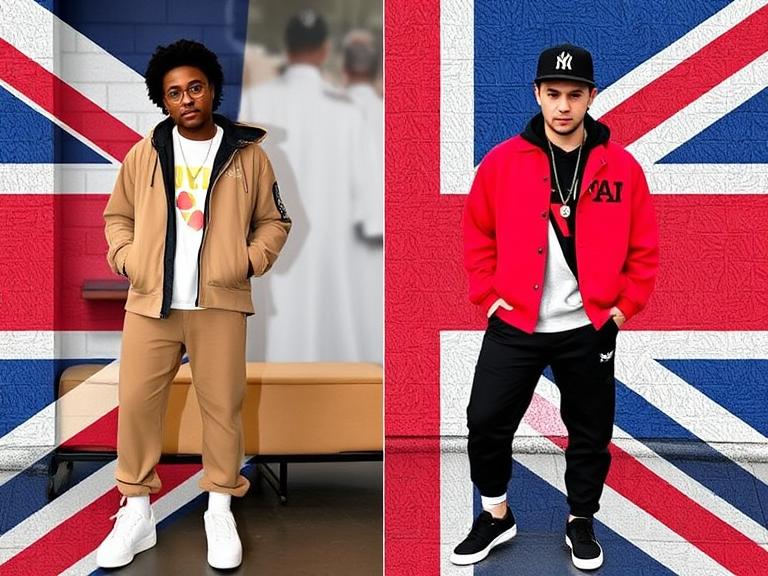
Urban Style in the UK: Regional Streetwear Spotlights
Share
Intro: Why UK Streetwear Still Rules
Streetwear isn’t just fashion in the UK — it’s an identity, a uniform, a stage whisper that says, “I know where I’m from and I’m proud of it.” Globally, the streetwear market is booming, valued at over USD 201 billion in 2024 and still climbing. In Britain, the rise of athleisure and urban wear has pulled in serious attention, with growth projected at a CAGR of 8.5% between 2023 and 2030. While traditional clothing retail in the UK feels a little tired (a sluggish -0.8% CAGR from 2020-2025), streetwear is charging forward like a Friday night crowd at Boxpark Shoreditch.
The UK fashion and textile sector contributes around £62 billion to the economy, employing over a million people. But when you narrow in on the streetwear scene, what’s fascinating isn’t just the big numbers — it’s the local flavors. Each city, each postcode, has its own twist, remixing the basic hoodie-plus-sneaker blueprint into something unmistakably its own.
London — The Grime & Capital Canvas
London is streetwear’s megaphone. Every borough tells a slightly different story, but together they amplify an unmistakable sound: grime, hustle, and raw cultural fusion. The influence of artists like Skepta and Stormzy isn’t limited to music charts; they’ve rewritten London’s streetwear DNA. Here, hoodies aren’t just comfy — they’re layered statements, worn oversized with puffers, cross-body bags, and chunky sneakers that seem ready to stomp across East London pavements.
The capital’s style leans bold yet functional. Utility harnesses, reflective stripes, and military greens are common, often offset by neon pops or designer collabs. Trapstar — born in London — embodies this spirit with its gritty prints and underground roots, while concept stores like Dover Street Market blur the line between streetwear and luxury. Londoners don’t just wear streetwear; they curate it like living art installations.
Manchester & the North West — The Industrial Edge
In Manchester, streetwear takes on the city’s industrial grit and musical heritage. Think: rainy streets, stone buildings, and beats from the Hacienda era still echoing through. That history seeps into fashion. The silhouettes here tend to be sturdier, more utilitarian. Cargo trousers, corduroy overshirts, and combat boots are popular — practical but stylish, perfect for both navigating a downpour and heading to a gig.
Unlike London’s louder logo culture, Manchester prefers understatement. Branding is often tonal, subtle, and sometimes invisible. The Northern Quarter acts as the nucleus of independent fashion, where small designers and pop-up stores sell limited runs with a focus on craftsmanship. There’s a quiet confidence here: Manchester doesn’t need to shout — it just shows up looking sharp, raincoat and all.
Bristol & the South West — Creative Subculture Fusion
Bristol, forever the rebel, dresses exactly as you’d expect a city of street art and underground sound systems to dress: wild, expressive, and experimental. Streetwear here leans heavily on skate culture and graffiti art. Oversized tees feature bold prints, tie-dyes, or even hand-painted details. Looser fits dominate, giving movement and flow — perfect for skaters on Park Street or dancers at a reggae night.
This is a city where fashion meets art head-on. Independent shops often double as galleries, showcasing local creatives who design, print, and stitch their own collections. Collaboration is everything; streetwear drops often coincide with art festivals or music events. In Bristol, your hoodie might be more than a garment — it’s practically a canvas.
Glasgow & Scotland — Cold Climate, Sharp Lines
Glasgow’s streetwear scene is defined by the weather as much as by culture. The cold, wet climate demands layering and practicality, but Scots do it with a sharp edge. Technical outerwear dominates — Gore-Tex shells, fleece mid-layers, waterproof cargos. But don’t mistake functionality for blandness: darker palettes are often broken up with tartan trims, heritage knits, or flashes of bold sneaker colorways.
Music plays a massive role here too. The underground rap and electronic scenes have fostered a new wave of Scottish streetwear that blends global influences with local pride. Independent labels in both Glasgow and Edinburgh lean into storytelling — referencing Scottish slang, landmarks, and identity in their drops. It’s a streetwear style built for the weather, but it doesn’t compromise on swagger.
What Shapes Regional Differences?
Why does London scream logos while Manchester whispers minimalism? Climate, culture, and community are the big three drivers. Rain and cold mean technical gear in Scotland, while Bristol’s sunshine (well, relatively) encourages freer fits. Musical heritage matters: grime in London, indie in Manchester, reggae in Bristol — all bleeding into wardrobes. And local pride gives each city’s designers their unique stamp, from slogans in dialect to collabs celebrating local landmarks.
Streetwear in the UK isn’t just about clothing; it’s about belonging. Whether you’re in East London with a reflective vest or in Manchester in a muted overshirt, your clothes signal your city as much as your playlist does.
Trends to Watch
Streetwear evolves fast, but some trends are shaping up to stick around:
-
Techwear & smart fabrics: Outerwear that looks futuristic but works for daily life.
-
Sustainable drops: Upcycled or limited-run collections with ethical backstories.
-
Hyperlocal micro-drops: Brands tailoring releases for specific cities or even neighborhoods.
-
Blurring gender lines: Fits that are fluid, wearable across all identities.
-
Digital + physical fusion: AR try-ons, QR codes that tell your garment’s story.
UK streetwear isn’t just chasing global trends — it’s remixing them regionally, making them feel lived-in and authentic.
Why FinalBosss.com Belongs in the Picture
All this talk of UK streetwear would be incomplete without shouting out spaces that actually bring it all together. That’s where FinalBosss.com comes in. It’s not just another e-store; it’s a digital playground for streetwear lovers who want bold, curated pieces that speak louder than mainstream fashion racks ever could.
FinalBosss taps into the same energy we’ve been spotlighting — unapologetic, fearless, and culturally aware. If London’s grime edge, Manchester’s utilitarian calm, Bristol’s creativity, or Glasgow’s technical sharpness inspires you, chances are you’ll find something at FinalBosss that mirrors that mood.
In short: it’s where your wardrobe levels up.
